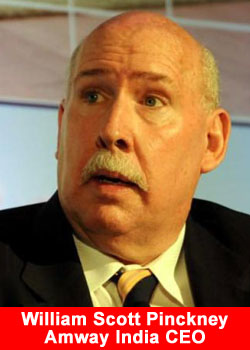India Pressured To Change Laws After Amway Arrest

Business groups are rallying behind Ada-based Amway's operation in India after its top executive in the country was hauled off to jail following a consumer complaint alleging the company is operating an illegal pyramid scheme.
The American Chamber of Commerce in India, known as Amcham, and industry body Ficci contend the headline-making arrest increases the urgency to update laws to better differentiate legitimate direct sales companies from scams.
Amway India CEO Bill Pinckney was arrested May 26 in the northern city of Gurgaon, near the nation's capital New Delhi, and was taken more than a thousand miles south to the town of Kurnool, where a local judge ordered him into custody until June 7, according to Times of India.
Pinckney's arrest, his second since May 2013, came after a warrant was issued in response to a complaint accusing the direct sales giant of various infractions, including cheating, extortion and irregularities in its business operations in the country.
A Didar Singh, who heads the India industry group Ficci, called Pinckney’s incarceration inappropriate and unwarranted, adding that the complaint should be handled as a consumer redressal rather than a criminal investigation. He said he fears the incident could deter other foreign companies from investing in the country.
Business groups are pressuring the government to update its 35-year-old the Prize Chits and Money Circulation Schemes (Banning) Act 1978 (PCMCS), enacted against illegal lottery and money circulation schemes 20 years before legitimate direct sellers entered the market in 1998.
Direct sellers shouldn't be grouped under this law, say business groups.
The Act in its present form is unable to distinguish genuine direct selling companies from pyramid or Ponzi schemes. Like other countries, India needs to amend this act and create a conducive legal environment for the Industry, Amcham India Executive Director Ajay Singha told the Hindu Business Line.
Amway says part of its problem in India is that its business model is misunderstood. The direct selling company that uses multilevel marketing to sell cosmetics, vitamins and household products through independent distributors, instead of stores.
Distributors earn commissions through the sale of products their group makes, but not by recruiting new distributors into the business, the company says. The latter would make it a pyramid scheme.
Amway, along with the direct selling industry and other groups, has long been lobbying for the country’s government, at both the national and regional levels, to amend the PCMCS Act.
“We are aggrieved and shocked at the sudden and unwarranted act of detention of our official, Amway India said in a message on its Facebook page. Due to the lack of a legal framework for the direct selling Industry, any case filed is being misinterpreted. Amway, as a law abiding corporate, has always cooperated in such investigations, and has been responsive to the queries and documentation.”
Amway India maintains that it has not only followed the country’s laws, but has made a significant investment in India including a new $100 million manufacturing facility. The company says it employs 500 workers at its facilities in the country.
Get more information, facts and figures about Amway, click here for the Amway overview.